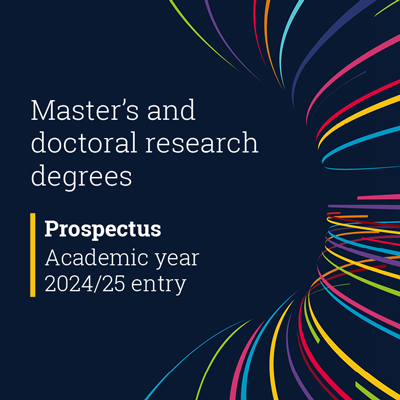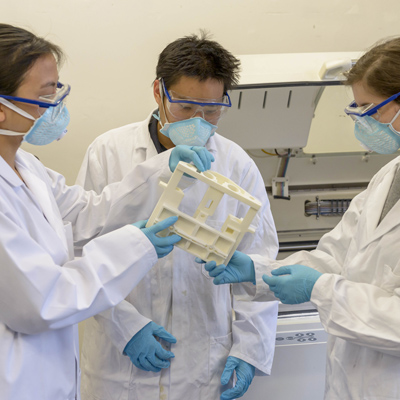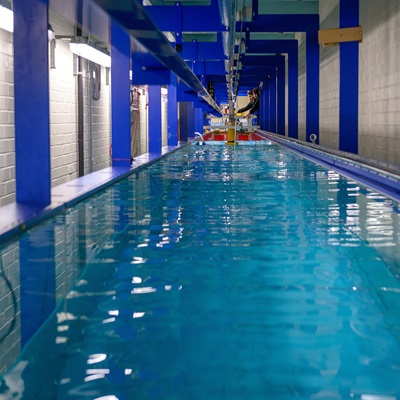Cranfield's dynamic, research-intensive and specialised position means our research students are able to study exciting projects that have an impact globally and make a practical difference to the world.
Our passion for the areas we operate in and our long-standing relationships with some of the most prestigious companies in industry mean that studying at Cranfield will open doors for you.
Ways to study a doctoral research degree at Cranfield
Funded research opportunities
We have a range of existing research projects that you can become involved with. These are fully-funded opportunities, often in collaboration with industry and research councils.
To view all of the available research opportunities and to apply please visit the Research Opportunities page.
Individual research projects
If you have an area of research that you would like to explore further then please use our people finder to find a relevant academic, then email the enquiries office who will ensure your application and proposal are directed to either the academics you have found or the most appropriate academic supervisory team who can then support you in developing your proposal and research.
Employment-related research projects
If you and/or your employer have a concept for a research project linked to your area of work then we can help develop and support this. Many of our students are able to pursue a research degree whilst still working with their current employer and our flexible approach to learning and delivery ensures it is a balanced and fulfilling experience.
Emerging research interests
Cranfield is fully focused on identifying and meeting the real-world challenges of today and tomorrow. We currently specialise in the following areas:
Big data,
Circular economy,
Risk and resilience,
Technology and leadership,
Transforming developing countries.
Students interested in either individual research projects or employment-related research projects can find out more information about our specialist areas on our Grand Challenges page.
All of our doctoral research programmes lead to the following degree award types:
Doctor of Philosophy - PhD
Full-time (3 years), part-time (6 years)
Completion of a PhD involves original research work which results in either developing entirely new areas of study, or is concerned with the application of novel and existing ideas in new ways and new fields of activity.
A programme of support and a dedicated supervisor, together with research training programmes, are provided to help you achieve your PhD.
Our flexible approach to studying at Cranfield allows you to carry out part of your research away from the University, perhaps overseas, and as appropriate if you need to undertake extensive local fieldwork or want to research a problem of local relevance.
Assessment is via the completion of a thesis which demonstrates a significant contribution to learning followed by a viva voce examination - a verbal defence of your written thesis.
School of Management researchers on the PhD programme are registered for either 4 years (full-time) or 6 years (part-time). Further information can be found on the School of Management PhD page.
Doctor of Business Administration - Executive DBA
Part-time only (4 years)
This research programme involves students using their work roles or workplace for the basis of their research.
Completion of three linked research projects, a literature review and a taught element of study will result in a thesis which addresses a specific managerial issue or problem.
The Executive DBA must constitute a contribution to knowledge and/or the significant application of existing knowledge to new situations and must demonstrate your ability to undertake further research without supervision.
Engineering Doctorate - EngD
Full-time (4 years)
Completion of the degree of Doctor of Engineering recognises the completion of a structured programme of learning and/or skills development related to the subject.
The programme is taken over four years. Students conduct PhD-equivalent research and undertake a master taught technical course whilst working closely with an industrial sponsor. Successful candidates are awarded the degree of Doctor of Engineering (EngD) and are addressed as doctor.
Assessment is via the completion of a thesis which demonstrates a significant contribution to learning followed by a viva voce examination - a verbal defence of your written thesis.
Master of Philosophy - MPhil
Full-time (2 years), part-time (4 years)
An MPhil is a research-oriented master’s degree that offers a student with substantial grounding in state-of-the-art academic knowledge with advanced research skills.
The thesis produced should demonstrate the candidate’s ability to conduct original investigations and to test ideas, exercising in-depth critical judgement in their area of study.
Assessment is via the completion of a thesis which demonstrates a significant contribution to learning followed by a viva voce examination - a verbal defence of your written thesis.
Master of Science - MSc by Research
Full-time (1 year), part-time (2 years)
This intensive research degree allows successful candidates to demonstrate their ability to conduct research, whilst benefiting from the support of their supervisors. At the end of the course a thesis is submitted and assessed by appointed examiners. Your research will represent a contribution to knowledge, or the application of existing knowledge to new situations.
Ongoing support
Throughout your studies, you will be supported by experienced faculty and benefit from the stimulation that comes from being part of a vibrant research community. You will work with your supervisor in close partnership with comprehensive guidance at every step of your journey. For more information please visit the Support Services page.







